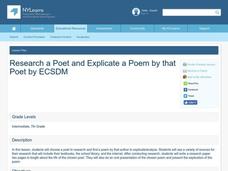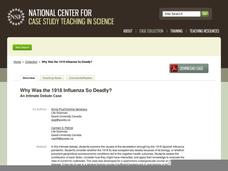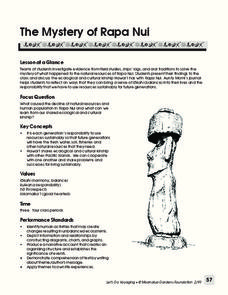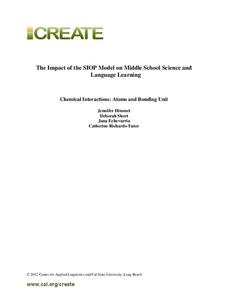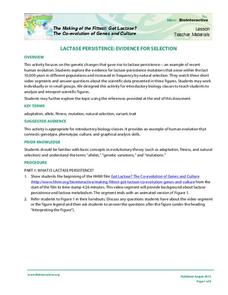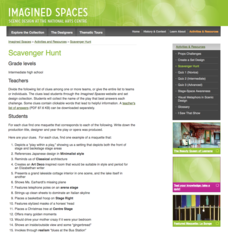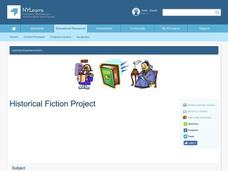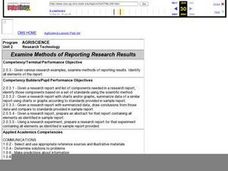New Class Museum
Lesson: Elizabeth Peyton: Portraits: Androgyny in Contemporary Culture
Portraiture, artistic expression, romanticism, and androgyny are discussed in a thought-provoking lesson. Upper graders first discuss and examine the history of portraiture and the elements common to the Romantic style. Then they turn...
Curated OER
Budget Bonanza
Students demonstrate how to use a budget plan. In this consumer math lesson, students calculate the total cost of data and determine if they are within budget. Students use calculators to determine the total cost. There is a rubric...
Curated OER
Research a Poet and Explicate a Poem by that Poet
Using your school's media center, internet research, and a SMART board, 7th graders research a chosen poet and write a research report. Additionally, 7th graders explicate one poem by the poet within their report. Several resource links...
Curated OER
The Daily Idiom
What is an idiom? Learners identify and read common idioms. They discuss what idioms are, and are given a black line master embedded in the plan that has 100 common idioms. Next, they complete "The Daily Idiom" worksheet, which is...
Curated OER
Developing an Outline
A lot of writers don't like creating an outline before writing the first draft of their paper. Introduce them to what an effective and organized outline looks like with this presentation. Designed for higher education, you could easily...
National Center for Case Study Teaching in Science
Why Was the 1918 Influenza So Deadly?
Which factor was more influential in the 1918 flu epidemic: biology, or social and political conditions? Your AP biology class will research and debate one of these positions in an interesting and challenging lesson. Intended for...
Orange County Water Atlas
Location, Location, Location…
Young geographers discover not only how to read and recognize coordinates on a map, but also gain a deeper understanding of latitude and longitude and how climate changes can vary significantly across latitudes.
University Interscholastic League
English Lesson to Prepare for UIL Spelling and Vocabulary Contest
"i before e. . ." Spelling is easier if kids know the eight basic spelling rules contained in this resource packet.
Houghton Mifflin Harcourt
That’s Amazing!: Challenge Activities (Theme 3)
Synonym dominoes, anyone? As part of the activities designed for kids who have mastered the basic concepts in the Houghton Mifflin Harcourt thematic unit That's Amazing! kids are offered a variety of activities that include developing a...
Moanalua Gardens Foundation
The Mystery of Rapa Nui
What caused the collapse of the environment on Rapa Nui (Easter Island)? Who constructed the Moai? What was their purpose? Class members assume the role of investigators and use evidence drawn from field studies, ships' logs, and...
Curated OER
Fracking: Positive or Negative Impact?
Your teenagers may have heard of fracking, but do they really know what it is? And could they debate the benefits and risks? Educate your environmental science class with a lesson about hydraulic fracturing, non-renewable energy sources,...
Center for Applied Linguistics
Chemical Interactions: Atoms and Bonding
Watch budding chemists interact with the resource on chemical interactions. In the unit, six lessons provide an overview of basic chemistry, from understanding the development of atomic theory to distinguishing between ionic and covalent...
Trinity University
Explain Yourself: An Expository Writing Unit for High School
Introduce expository writing with a unit that asks writers to craft an essay to explain a belief, value, or priority that is important to them. Mini-lessons within the unit focus on crafting thesis statements and conclusions, selecting...
Howard Hughes Medical Institute
Lactase Persistence: Evidence for Selection
What's the link between lactase persistence and dairy farming? Biology scholars analyze data to find evidence of the connection, then relate this to human adaptation. Working individually and in small groups, learners view short video...
Social Media Toolbox
Verification
When you're putting together a great story, you've got to consider the source! Scholars discover the dangers of errors in reporting during the 14th activity in a 16-part Social Media Toolbox series. Groups collaborate to create a source...
Kenan Fellows
Unit 1: Introduction to Biotechnology
Biotechnology is big! Introduce the uses of biotechnology to science scholars with a fascinating, fact-filled unit. The first installment in a series of four biotechnology units covers the role biotechnology plays in human and...
National Arts Centre
Scavenger Hunt
Young theatre artists engage in a scavenger hunt to acquaint themselves with set design. The challenge is to search the site and match a separate maquette with each of the 24 clues.
Trinity University Digital Commons
Romanticism: Past and Present
With its focus on nature, individualism, imagination, and rejection of traditional authority, Romanticism has great appeal to young high schoolers. After examining classic paintings and poems as well as current works, class members...
Curated OER
Historical Fiction Project
Students be engaged in a history project that is combined with Language Arts with the purpose of teaching students how to cite bibliographic information. This is important for doing future research.
Curated OER
What's On Your Plate?
If you are teaching in a Christian school, Sunday School, or home school environment, then this instructional activity would be appropriate. The class discusses Biblical traditions and culture and how that related to current Christian...
Curated OER
Highway of Words
The punctuation police are here! Dress up as a police officer, and teach your young learners the importance of using correct punctuation. Two poorly written paragraphs are presented to the learners, and they have to correct the errors in...
Curated OER
Using Dictionary Entries
Work on word pronunciations by exploring the dictionary. Learners complete a worksheet containing questions about dictionary entries. They review how to use a dictionary, identify syllable breaks, parts of speech, and word pronunciation.
Curated OER
The Balkans and World War I
Pupils review the causes of World War I and draw timelines of the 1914 events. They conduct Internet research to discover the role of the balkans in the war and how it spread to a worldwide conflict. Students then research the recent...
Curated OER
Examine Methods of Reporting Research Results
Students analyze a research report and the list of components needed in a research report and then identify those components based on a set of standards using the scientific method. They collect data which can be used for a graphical...




